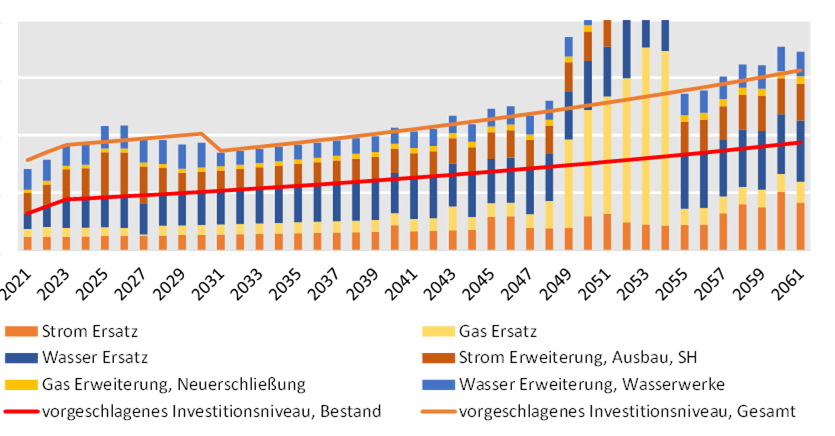Asset Management
renewal planning
Project name: Evaluation of the renewal planning of a municipal utility in the electricity, gas and drinking water sectors
Commissioned by: German distribution network operator
Timeframe: 2020-2021
Contact: Alexander Ladermann

Finanzbedarf bei vorgeschlagenem Investitionsniveau – Summe über alle Sparten einschl. separat geplanter Einzelmaßnahmen und Netzerweiterungen [1]
As the operator of the electricity, gas, water and district heating supply networks in Diepholz, Stadtwerke EVB Huntetal Netz GmbH (SWN) is responsible for asset management and, as part of this, for determining optimal renewal strategies. To support this, SWN commissioned Consentec to forecast the future capital requirements for the renewal of the networks in these divisions, taking into account specifications such as quality and risk levels.
Our asset simulation tool Neos was used for this, which uses data on the network asset portfolio and its condition (i.e. at least its age structure) to simulate the effects of measures taken by the network operator on the condition and thus the operating behaviour of the network assets, thereby forecasting the development of cost and quality indicators over time. Another result is the optimised budget allocation to the network assets, taking into account strategy specifications (such as maximum useful lives) and budget or resource limits.
For the study, various strategy variants were simulated with regard to useful lives and quality level specifications. As expected, it was shown that the lowest financial requirements for renewals arise when the technically possible useful lives are fully utilised. In this case, the number of disruptions would remain below the national average in the next 10 years – except in the electricity grid – but would increase significantly in the long term in all sectors, so that this strategy does not appear to make sense overall. On the other hand, if maximum useful lives are applied in the amount of the depreciation periods according to the Network Charges Ordinance, this would result in very good quality levels, since the shorter reinvestment cycles would mean that there would be no significantly aged operating resources in the network.
However, the financial requirements for renewals would be correspondingly high. In practice, operating resources can and are operated beyond the useful lives specified in the Network Charges Ordinance, so that it does not appear to make sense to base this on them either.
A middle way is offered by the strategy of optimising the scope of renewal in such a way that today’s quality level is maintained. For this purpose, a budget progression differentiated by sector was derived. SWN has added separately planned individual measures and network expansions to this proposal and transferred it to a medium to long-term plan. This formed the basis for coordinating the resulting capital requirements with the asset owner. Although the calculated demand in the period between 2050 and 2055 exceeds the derived budget, this is mainly due to measures in the gas network. In this regard, it was decided to first await the future development of heat demand coverage (including municipal heating planning) and to make a decision at the beginning of the 2030s about a budget correction that may then be necessary.
Sources:
[1] Consentec GmbH